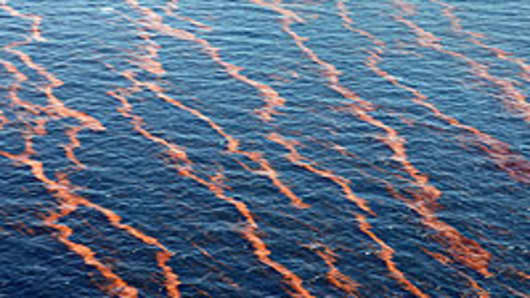Officials from BP have successfully tested a chemical that attaches itself to oil and weighs it down to the ocean floor, where there are natural forces that absorb the oil, CNBC has learned.
The oil giant said it tested the dispersants, which are manufactured by Nalco, last night, and is authorized to begin using it on a larger scale.
BP said it is looking for additional suppliers to begin manufacturing the material in mass quantities.
Nalco told CNBC that it is working to increase production at its Sugarland, Texas, plant.
The news comes as rough seas have been hampering efforts to contain the spreading oil slick, which threatens shoreline along the Gulf Coast.
By Saturday, it was becoming apparent that the oil spill may be far more devastating than first feared.
Obama to Tour Region
The White House announced earlier that President Barack Obama would head to the Gulf Coaston Sunday to get an update on efforts to contain the massive spill.
How far the spill will reach is unknown, but the sheen already has reportedly reached into some precious shoreline habitats and remains unstopped and impossible to measure, raising fears that the ruptured well could be pouring more oil into the Gulf than estimated.
On Saturday afternoon, the Coast Guard said it was "impossible" to estimate how much oil had spilled since the April 20 explosion on the Deepwater Horizon that killed 11 workers. But some experts predict the environmental mess could eclipse the Exxon Valdez disaster, when an oil tanker spilled 11 million gallons off Alaska's shores in 1989.
Already, the spill is interrupting business activities in the Gulf. Several offshore drilling platforms have ceased working, and the Coast Guard said it could interfere with shipping approaches in the Gulf ports.
The Coast Guard has said that the oil has not impacted tanker traffic to the Mississippi River yet.
Fishing Halted
CNBC also has learned that all Louisiana fishing East of the mouth of the Mississippi River. This will no doubt be a tough blow on the fishing and tourism industries in the region.
Some reports say the size of the slick appears to have nearly tripled in just a day or so. On Thursday, the size of the slick was about 1,150 square miles, but by Friday's end it was in the range of 3,850 square miles, said Hans Graber, executive director of the university's Center for Southeastern Tropical Advanced Remote Sensing, in an interview with the Associated Press. That suggests the oil has started spilling from the well more quickly, Graber said.
"The spill and the spreading is getting so much faster and expanding much quicker than they estimated," Graber told AP on Saturday.
Ian R. MacDonald, an oceanography professor at Florida State University, told AP that his examination of Coast Guard charts and satellite images indicated that 8 million to 9 million gallons had already spilled by April 28.
But with oil continuing to flow into the ocean, estimating the size of the spill is not as critical as the ongoing efforts to contain it. BP has been reaching out to rivals for ideas, which may have led to the discovery of the chemical it is now using.
Some of the dispersants BP had tested had never before been used at such depths.
Meanwhile, crews continue to attempt to activate the well's underwater shut-off values using remotely operated vehicles. But these attempts have been unsuccessful so far.
The company also is drilling a relief well in hopes of sealing off the leak, but that could take three months.
While the cause of the explosion remains under investigation, there have been more than two dozen lawsuits filed. According to the AP, some of these reports claim it was caused when workers for oil services contractorHalliburtonimproperly capped the well — a process known as cementing. Halliburton denied it.
As the fingerpointing continues, the government has halted any new offshore drilling projects unless rigs have new safeguards to prevent another disaster.
Meanwhile, as precaution, several offshore oil and natural gas production platforms have been shut down in the Gulf of Mexico, according to the U.S. Minerals Management Service.
-The Associated Press contributed to this report.
Slideshows:


